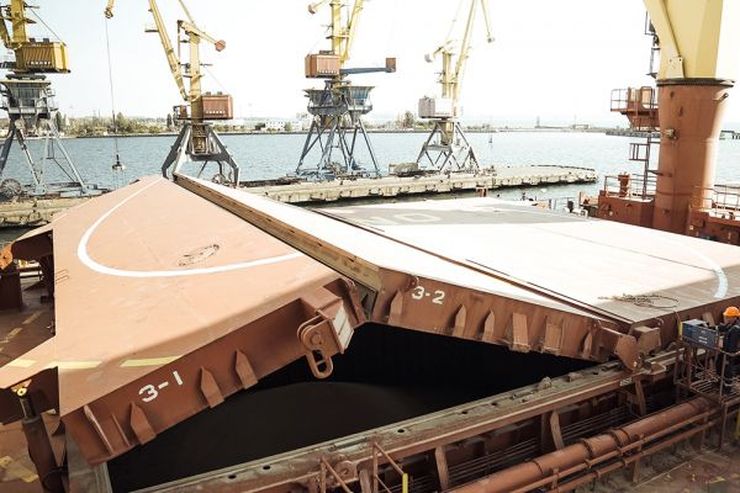200 thsd tons of Ukrainian wheat stuck in Egypt — traders await payment under government contracts

Eight ships with Ukrainian wheat remain in the raids of Egyptian ports due to delays in opening letters of credit for the state buyer Mostakbal. According to market participants, about 200 thousand tons of grain remain unpaid, and most of the contracts were concluded back in September, writes Latifundist.com.
Context. Earlier, the Fastmarkets publication reported that the delays are related to the new system of state grain procurement in Egypt, which is carried out by Mostakbal Misr (Future of Egypt) instead of the former operator GASC.
Fastmarkets noted that difficulties could have arisen due to a change of bank, long terms of letters of credit (up to 270 days) and the participation of private intermediaries, such as Isotech, which complicated the chain of payments. According to the publication, some of the ships were stuck in the port for more than a month (from September 11-12).
As Atria Brokers broker and ASAP Agri director Khrystina Serebryakova told Latifundist.com, the first signs of the problem appeared in early October, when Egyptian demand practically disappeared for a week. According to her, traders found out that Egypt had technical difficulties with opening letters of credit – bank guarantees of payment for the delivered grain.
“In early October, we saw that demand from Egypt had disappeared for at least a week, and it became clear that something bad had happened. We found out that Egypt had problems with opening letters of credit. Because of this, up to 15 ships were on the roadstead, and this was immediately reflected in prices – they decreased on the Egyptian market,” Serebryakova noted.
She adds that currently about eight ships with a total cargo of about 200 thousand tons remain unpaid, but traders expect the situation to be resolved in the near future.
“We hope that by the end of October these problems will be resolved, and from the new month we will see renewed interest from Egypt at reasonable market prices,” she said.
Among the companies that have faced delays is Qortia AG. The company’s co-owner, Konstantin Kuflik, said that the company has been fulfilling Mostakbal’s state contracts for wheat supplies for a long time.
“In this ‘traffic jam’ we had six vessels under Mostakbal contracts. We have already fully unloaded two, the third is currently being unloaded, and two more are standing in the roadstead. We have removed one vessel from the queue and sent it later,” he said.
According to him, the company works directly with the state buyer, without intermediaries. All contracts are drawn up through letters of credit, but Egyptian banks do not adhere to standard document processing deadlines.
“According to international practice, the bank should respond within five business days after submitting the documents. But this is not happening. The Egyptian side is delaying confirmation, citing internal checks or technical nuances. Because of this, payments have been suspended, and the vessels are actually standing still,” explains Kuflik.
He noted that the demurrage for the vessels’ downtime has not yet been compensated, so the financial burden falls on traders.
“We are gradually closing all settlements. Despite the difficulties, we have fully fulfilled our obligations to our partners. Together with our Egyptian colleagues, we are working to ensure that the situation improves in the near future and the settlement system returns to normal operation,” he added.
The co-owner of Zaria Trade, Oleksandr Yanev, also reported on the partial resumption of payments. According to him, the partners have already made half of the payments and promised to fully close the settlements in the near future.
“To date, we have received about 50% of the payment, and the partners promise to fully close the settlement in the coming days. We can already plan further, cover our expenses and work according to schedule,” he noted.
Yanev believes that the reasons for the delays are technical.
“The reason is the change of bank within Egypt. All payments go through letters of credit, and when the bank, currency or payment policy changes in this chain, there is an immediate pause. A letter of credit is a slow tool, so such situations are not uncommon in the region,” he explains.
“This time, several factors coincided: a change of bank, difficulties within the country and a large volume of transactions. The Egyptians took on a little more than they could quickly “digest”. Therefore, the delay is more of a technical story, rather than a default or a deliberate blocking of payments,” the co-owner of Zaria Trade concluded.
Read also
Abbey Commodities – General Partner of BLACK SEA GRAIN.KYIV-2026
Black Sea & Danube Barley Market at a Turning Point: Demand Pressure and Regi...
US Supreme Court rules Trump’s emergency duties illegal
Mercosur: Protective measures for European agriculture
US makes concessions on pulses in new trade deal with India
Write to us
Our manager will contact you soon



